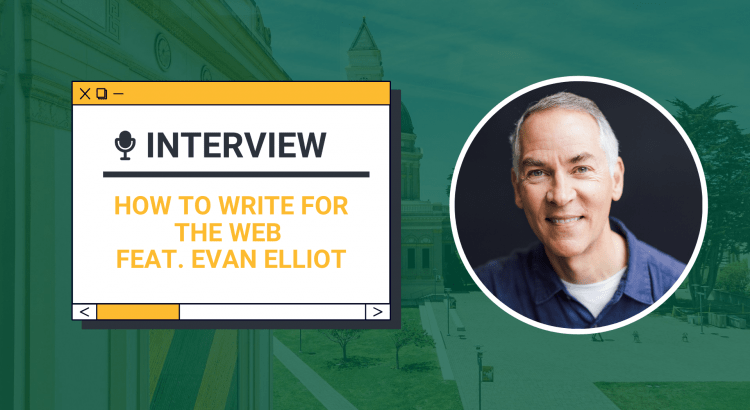Evan Elliot, senior writer on the OMC content team, can’t wait to see the redesigned USF website. He’s especially excited about the words.
What’s your copy strategy for the new website?
Write with nouns and verbs, speak to the reader about the reader, and tell the reader what to do.
Why should we write with nouns and verbs?
We should write with nouns and verbs because most universities don’t write with nouns and verbs. Most universities write with adjectives and adverbs and opinions. Every campus is “inclusive.” Every plan is “strategic.” Every program is “innovative.” Every initiative is “bold.” Every course is “rigorous.” Every professor is “dedicated.” Every student is “engaged.” And every school is “passionately committed to academic excellence.” The problem with adjectives and adverbs is that they’re vague. They don’t mean anything. And because most universities use them, they’re just noise.
So nouns and verbs are the antidote to adjectives and adverbs?
Yes. Nouns and verbs deliver us from evil.
Example?
This is evil: “This intentional class is designed to provide resilient students with a daring, dynamic, experiential education.”
This is deliverance: “Roll up your sleeves and build an electric car in 15 weeks.”
What do you mean by “speak to your reader about your reader”?
Most universities write about students in the third person, like so: “At Springfield University, we are committed to providing diverse students with robust and relevant pedagogical content.” If I’m a prospective student, I don’t really want to hear what a university is “committed to providing.” I just want to hear what exactly the university offers me. And I don’t want to hear that university talk about “students.” I am not students. I am me. So I’d like that university to speak to me about me.
Example?
This sentence does not speak to me about me: “We are deeply committed to nurturing an engaged community that is dedicated to excellence and leadership in creating a sustainable energy future.”
This sentence speaks to me about me: “Study with experts. Network with leaders. Learn the science and systems, policy and programs, economics and finance of sustainable energy.”
So you want us to be specific?
Yes. Please be specific. And please show more than you tell. Don’t tell me that you “are dedicated to providing vibrant students with a welcoming environment.” Just welcome me. Don’t tell me that you “are committed to a global perspective.” Just show me a story about a USF graduate whose work helps the world. Most university websites are about 70 percent tell and 30 percent show. We’re working to make our new website 20 percent tell and 80 percent show. If we can achieve anything close to that ratio — with brief introductions followed by stories and examples and evidence and proof — our website will stand out.
What do you mean by “tell your reader what to do”?
Most university websites are manifestos. The universities preach about themselves. At USF we’re different, right? We’re Jesuit. We practice more than we preach, and we turn learning into action. So our new website is one big call to action, built on action verbs. We tell our reader what our reader will do at USF. Here are three introductions to three landing pages:
Make the City Your Classroom
Study murals in the Mission. Shadow a nurse in the Tenderloin. Learn in the city. Learn from the city.Study Abroad
Follow your passions wherever they lead. Choose from more than 100 programs in 45 countries.Change the World From Here
Come study with professors, not with graduate students. In small classes, not big lecture halls. Come join a community of faculty and classmates who see you, hear you, challenge you, help you.
Any last suggestions?
When you write for the USF website, read your words aloud. Imagine that you’re saying them to a friend. Would you say this to a friend?
“I am currently able to provide a diverse, ever-expanding learning community with a mission-driven educational experience.”
If you read your words aloud and you get embarrassed, that’s good. You can rewrite them.
